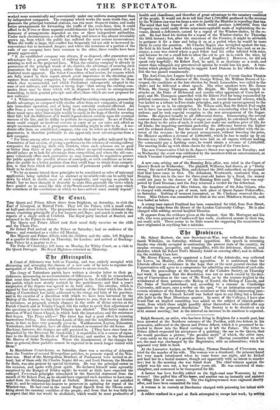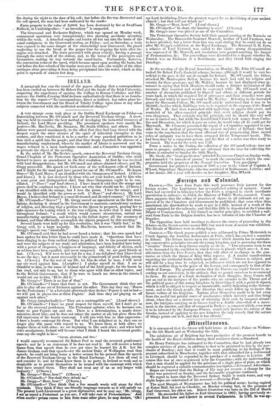ZOE 1Probinces.
Mr. Sidney Herbert, the new Secretary-at-War, was reelected Member for South Wiltshire, on Saturday, without opposition. His speech in returning thanks Was chiefly occupied in contrasting the present state of the country, its. surplus revenue, prosperity, and tranquillity, with the deficiency, distress, and disorder, which Sir Robert Peel's Ministry found on entering office; and in defend- ing the existing Corn-law. Mr. Henry Fitzroy, newly appointed a Lord of the Admiralty, was reelected for Lewes, on Monday, also without opposition. It is understood that the Liberals offered no resistance in the hope that at the next general election the Conservatives will agree to a compromise for admitting one candidate of each side.
From the proceedings at the meeting of the Camden Society, on Thursday last week, it appears that the dissolution was not so much caused by the deci- sion of Convocation in the case of Mr. Ward, as by the censure implied in the withdrawal of three patrons—the Bishop of Exeter, the Bishop of Lincoln, and the Duke of Northrunberland; and, according to a rumour in Cambridge- University, still more, says a writer on the spot, "to an intimation conveyed to- certain members of the Society, that its existence at this vitally-interesting junc- ture as regards the Church herself was looked upon in any thing but a favour- able light in the Most Illustrious quarter. In some of the Colleges, I have also heard that an implied something was added on the subject of church-prefer, ment, from which those might possibly debar themselves who should offer any. opposition to the proposed dissolution." The Society is to be dissolved at its next annual meeting; but in the interval an increase to its numbers is expected..
Ralph Stennett, an artist, who has been living in Brighton for a month past, has been arrested at the Northern entrance of the Pavilion, with two letters in his
possession, addressed to the Queen and Prince Albert, which it is presumed he in-- tended to throw into the Royal carriage as it left the Paleee. The letter to, Prince Albert requested his acceptance of a painting; the one te the Queen, that would purchase a picture, "the peculiar merit" of which, the artist says, "rests solely on the use of a peculiar brown tint." Having committed no overt act, the man was discharged by the Magistrates, with an admonition; which he appeared very little to heed.
At the Lancaster A,ssizei, on Wednesday, Thomas Donahoe, of Ulverstone, was tried for the murder of his wife. The woman was a drunkard: the prisoner found
her very much intoxicated when he came home one night, and he kicked and beat her in a brutal manner, though not apparently with an intent to murder her; but in the morning she was found dead. The chief witness against the culprit was his own son, a boy twelve years old. He was convicted of than- slaughter, and sentenced to be transported for life.
A farmer has been forcibly robbed on the high-road near Worcester, by two women I One pulled him off his-harse, and another ran up instantly and assisted in rifling him of some money. The two highwaywomen were captured shortly after, and have been committed for trial.
A woman is in custody at Dorchester charged with poisoning her infaet with arsenic.
A robber confined in a gaol at Bath attempted to escape last week, 4 setting.
fire during the night to the door of his cell; but before the fire was discovered and the cell opened, the man had been suffocated by the smoke.
-Farm property to the value of 2,0001. has been destroyed by fire at Swaff ham Bulbeck, in Cambridgeshire: "an incendiary" is suspected.
The Gravesend and Rochester Railway, which was opened on Monday week, commenced operations very inauspiciously; two alarnung accidents occurring
• within the week. A detached engine end tender all but ran into the basin of the canal contiguous to the Gravesend station on Friday: and on Saturday, a train was exposed to the same danger at the chain-bridge near Gravesend; the guard neglecting to use the break at the proper time for stopping the train after the engine was detached. The train proceeded with great velocity, forcing a passage through the outer work of the station' and, to the terror of the passengers and bystanders, making its way towards the canal-basin. Fortunately, however, the concussion reduced the speed, which became spent upon nearing the basin, but not before the fore-wheels of the tender were over the side; the weight of the other carriages alone preventing it from being precipitated into the water, which at this point is upwards of sixteen feet deep.



























 Previous page
Previous page